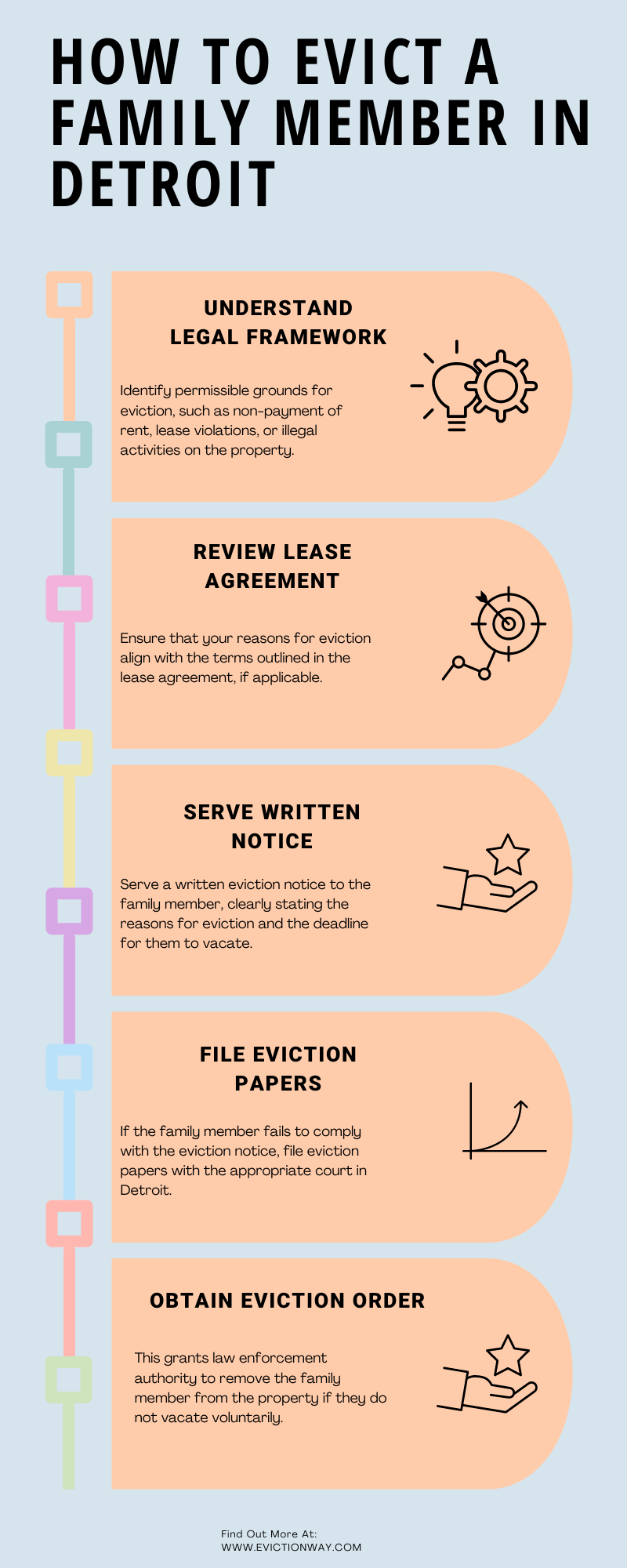In this article, we’ll guide you through the process of evicting a family member in Detroit. We’ll provide you with the best methods for doing so and explain the legal steps involved.
Evicting a family member can be a difficult and emotional process, but it’s important to remember that you have rights as a landlord. If your family member is causing problems or violating the terms of their lease, you may need to take legal action to evict them.
We’ll also share tips on how to remove a family member politely and provide you with information on the laws involved in evicting a family member in Detroit. We’ll also provide you with legal tips and advice to help you through the process.

How To Evict a Family Member In Detroit
Evicting a family member is never easy, but it may be necessary to protect your property and your peace of mind. If you’re considering evicting a family member in Detroit, here are six tips to help you through the process.
1. Document Everything
Keep a record of all communication with your family member, including phone calls, emails, and text messages. This will help you prove your case if you need to go to court.
2. Give Proper Notice
In Detroit, you must give your family member at least 30 days’ written notice to vacate the property. The notice must be served in person or by certified mail.
3. File a Complaint
If your family member does not vacate the property after receiving the notice, you can file a complaint with the 36th District Court. The court will then schedule a hearing to determine whether or not you have a right to evict your family member.

4. Attend the Hearing
It is important to attend the hearing and present your case to the judge. Be prepared to provide evidence to support your claim, such as the written notice you gave to your family member and any documentation of their refusal to leave.
5. Get a Judgment
If the judge rules in your favor, you will be granted a judgment of possession. This judgment gives you the legal right to evict your family member from the property.
6. Enforce the Judgment
Once you have a judgment of possession, you can hire a bailiff to enforce the judgment and remove your family member from the property. This is a last resort, but it may be necessary to protect your property and your peace of mind.

How Much Does it Cost to Evict a Family Member in Detroit?
Evicting a family member is never easy, and the costs can vary depending on your specific circumstances. In Detroit, the average cost to evict a family member is between $500 and $5,000.
This includes the cost of filing a complaint with the court, serving the eviction notice, and attending a court hearing. If you need to hire an attorney, the cost could be even higher.
| Description | Estimated Cost Range (USD) | Notes |
|---|---|---|
| Filing Fee for Eviction | $55 – $150 | This initial filing fee can vary depending on the court and specific case details. |
| Service of Process | $25 – $75 per service | Fee for the service of the eviction notice by a court officer or process server. |
| Attorney Fees | $200 – $500/hour | The hourly rates for legal services, which can vary significantly. |
| Court Costs | Varies | Additional court fees for the enforcement of a judgment or other legal filings. |
| Judgment Fee | $10 – $50 | Fee for obtaining a judgment for possession, if necessary. |
| Writ of Restitution | $15 – $100 | A legal order allowing the eviction to occur, with fees varying by court and complexity. |
| Bailiff/Mover Costs | $200 – $600+ | Charges for officially removing the tenant’s belongings from the property. |
| Loss of Rental Income | Variable | Income lost from unpaid rent or while the property cannot be re-rented during eviction. |
| Property Damage Repairs | $100 – $3,000+ | Cost of repairing any damages caused by the tenant. |
| Lock Changing Services | $50 – $150 | Cost to change the locks after an eviction is completed. |
| Storage Costs | $50 – $200/month | Depending on the amount of personal property that needs storing. |
| Miscellaneous Fees | Variable | Could include filing of additional motions, court document preparation, etc. |
FAQs: Evicting a Family Member in Detroit
Here are some of the most frequently asked questions about evicting a family member in Detroit:
What are the legal grounds for evicting a family member in Detroit?
In Detroit, as in most jurisdictions, you can only evict a family member if they have violated the terms of their tenancy, such as by failing to pay rent or breaking the lease agreement. You cannot evict a family member simply because you no longer want them to live with you.
What is the process for evicting a family member in Detroit?
The process for evicting a family member in Detroit is the same as the process for evicting any other tenant. You must first give them a written notice to vacate, which must state the reason for the eviction and the date by which they must leave.
If they do not leave by the deadline, you can file a complaint with the court. The court will then hold a hearing to determine whether the eviction is justified. If the court rules in your favor, you will be issued an eviction order, which you can then use to have the family member removed from your property.
Can I evict a family member if they are not on the lease?
Yes, you can evict a family member even if they are not on the lease. However, you will need to prove that they are actually a tenant, such as by showing that they have been paying rent or that they have been living in the property for a significant period of time.
Can I kick someone out of my house without notice in Michigan?
No, you can not kick him out In Michigan, you must follow legal eviction procedures, even if someone is staying in your house without permission. This includes providing proper notice and going through the court system.
How long does an eviction stay on your record in Michigan?
In Michigan, an eviction stays on your record for seven years from the original delinquency date.
How long does eviction take in Detroit?
| Action | Duration |
|---|---|
| Eviction notice period | 24 hours to 30 days |
| Service of summons to tenant | At least 3 days before the hearing |
| Eviction hearing | Within 10 days after service of summons |
| Issuance of writ of restitution | 10 days (In some cases, issuance may be immediate or delayed up to 6 months) |
| Transference of writ to sheriff’s office after issuance | Within 7 days |
| Execution of writ of restitution | No later than 56 days after issuance |
| Total | 2 weeks to 2 months |
Can you be evicted in Michigan without going to court?
No, in Michigan, you cannot be evicted without going to court. A landlord must file a formal eviction lawsuit and obtain a court order before legally removing a tenant.

What if the family member refuses to leave?
If the family member refuses to leave after you have given them a notice to vacate, you will need to file a complaint with the court. The court will then hold a hearing to determine whether the eviction is justified. If the court rules in your favor, you will be issued an eviction order, which you can then use to have the family member removed from your property.
Can I get help with the eviction process?
Yes, there are a number of resources available to help you with the eviction process. You can contact the Legal Aid Society of Detroit for free legal assistance, or you can hire a private attorney. You can also find helpful information on the website of the Michigan State Bar Association.
Related:
How to Evict a Family Member in Alaska
